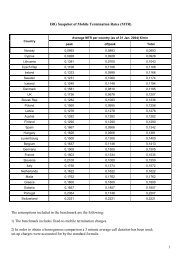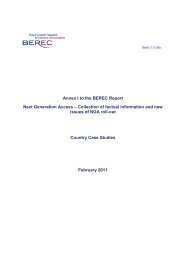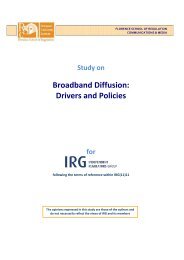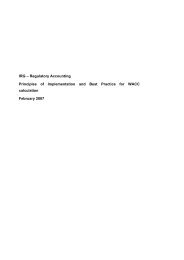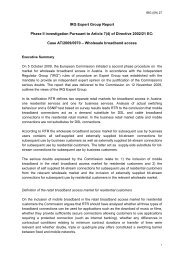16 Rev2b NGA Opinion Supplementary doc - IRG
16 Rev2b NGA Opinion Supplementary doc - IRG
16 Rev2b NGA Opinion Supplementary doc - IRG
Create successful ePaper yourself
Turn your PDF publications into a flip-book with our unique Google optimized e-Paper software.
ERG (07) <strong>16</strong>rev2b <strong>NGA</strong> <strong>Opinion</strong> <strong>Supplementary</strong> Doc 17 / 69<br />
provided over new infrastructures. In case of “substitute services” to existing ones NRAs<br />
should evaluate sufficiency of the imposed obligations only on legacy network elements. And<br />
in case of “new services” provided over new infrastructures NRAs should refrain from imposing<br />
wholesale obligations (irrespective whether Market 12 or any other Market).<br />
The “layer-based” delineation between Market 11 and 12 is criticized by one comment<br />
(ETNO) as being “driven by technical considerations and not being technologically neutral”.<br />
This would imply substitutability of LLU at the MDF and unbundling of copper at the building<br />
in an FttB scenario. On the other hand, unbundling of optical fibre at the ODF (falling into<br />
Market 11 according to the ERG notion) and Bitstream at almost the same point would not be<br />
substitutable, although both provide comparable quality for end-user services.<br />
One comment of an incumbent disagrees with the statement that Bitstream reduces the freedom<br />
to control QoS parameter compared to unbundling (KPN). According to this view,<br />
wholesale broadband access services provided over Ethernet allow flexibility in quality and<br />
functionality that matches MDF access. Bitstream even offers advantages over unbundled<br />
access in strengthening competition at the service level (software-based Bitstream service<br />
enabling the end user to more easily change the service provider) and maximising the reach<br />
of service provider.<br />
Contrasting to this, another comment clarifies that Bitstream is no substitute for unbundling<br />
(Telecom e.V.). Another considers it important to avoid that incumbents use Bitstream to<br />
limit infrastructure based competition by forcing entrants to become mere resellers (Fastweb).<br />
ERG Considerations<br />
The ERG considers that the Regulatory Framework promotes sustainable competition by<br />
regulating access to the network of the company with significant market power; it does not<br />
differentiate between legacy network elements and other infrastructure. This distinction<br />
would also be in conflict with the postulate of technology neutrality in the Framework.<br />
Furthermore, ERG considers that in order to maintain as far as possible the benefits of infrastructure<br />
competition based on LLU, the design of the WBA product may need to be enhanced<br />
to deliver as close as possible level of innovation capability to operators, enabling<br />
them to differentiate their service offerings and compete as far as possible on an equivalent<br />
basis to the infrastructure owner. One example of this could be a WBA product which gave<br />
operators control of QoS to enable high quality IPTV.<br />
However, even an enhanced BSA product will give alternative operators less functionality<br />
control and is, therefore, never a full substitute to LLU. It remains a “managed” wholesale<br />
access service while unbundling always provides maximum control.<br />
ad 4.3 Regulatory Challenges and Remedies in Scenario I: FttC<br />
ad 4.3.1 Possible barriers<br />
Consultation Comments<br />
It is pointed out in one comment that, in the (near) future, Line Card Access at the street<br />
cabinet level may turn out to be a possible solution for lowering barriers of entry (QSC).



